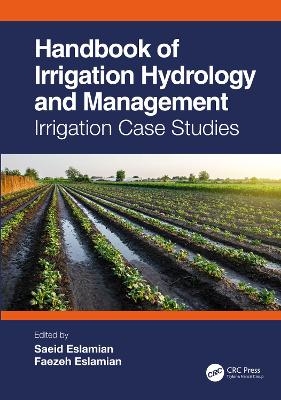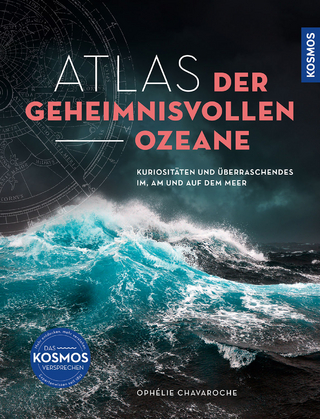
Handbook of Irrigation Hydrology and Management
CRC Press (Verlag)
978-1-032-42910-6 (ISBN)
- Lieferbar (Termin unbekannt)
- Versandkostenfrei innerhalb Deutschlands
- Auch auf Rechnung
- Verfügbarkeit in der Filiale vor Ort prüfen
- Artikel merken
Ever-increasing population growth has caused a proportional increased demand for water, and existing water sources are depleting day by day. Moreover, with the impact of climate change, the rates of rainfall in many regions have experienced a higher degree of variability. In many cities, government utilities have been struggling to maintain sufficient water for the residents and other users. The Handbook of Irrigation Hydrology and Management: Irrigation Case Studies examines and analyzes irrigated ecosystems in which water storage, applications, or drainage volumes are artificially controlled in the landscape and the spatial domain of processes varies from micrometers to tens of kilometers, while the temporal domain spans from seconds to centuries. The continuum science of irrigation hydrology includes the surface, subsurface (unsaturated and groundwater systems), atmospheric, and plant subsystems. Further, the book includes practical case studies from around the world, including locations such as Africa, Australia, China, India, the Middle East, the United States, and more.
Features:
Offers water-saving strategies to increase the judicious use of scarce water resources
Presents strategies to maximize agricultural yield per unit of water used for different regions
Compares irrigation methods to offset changing weather patterns and impacts of climate change
Dr. Saeid Eslamian is professor of Hydrology at Isfahan University of Technology, where he heads the Hydrology Research Group in the Department of Water Engineering. His research focuses mainly on statistical and environmental hydrology and climate change. In particular, he is working on modeling and prediction of natural hazards including flood, drought, storms, wind, groundwater drawdown, and pollution for arid and semi-arid zones, particularly in urban areas. He is also a Visiting Professor at Princeton University, and University of ETH Zurich, Switzerland. He has contributed to more than 300 publications in books, research journals, and technical reports or papers in conferences. He is the Founder and Editor-in-Chief of both the International Journal of Hydrology Science and Technology and the Journal of Flood Engineering. He received ASCE and EWRI awards in 2009 and 2010 for his research. Dr. Faezeh Eslamian current research focuses on the fate and transport of phosphorus through subsurface drained farmlands. Dr. Eslamian completed her PhD at McGill University, and her bachelor’s and master’s degrees in civil and environmental engineering from Isfahan University of Technology, Iran, where she evaluated natural and low-cost absorbents for the removal of pollutants such as textile dyes and heavy metals. Furthermore, she has conducted research on the worldwide water quality standards, wastewater reuse, and drought guidelines.
Part I: Australian Experiences. 1. Irrigation Developments in Australia: Historical Development of Irrigation. 2. Irrigation Developments in Australia: Irrigation and Agricultural Production. 3. Optimisation of Twinged Stormwater Storage for Golf Course Irrigation: a Case Study in Sydney. Part II: African Case Studies. 4. Deficit Irrigation: A Review from Ethiopia. 5. Investigating the Working Hydraulic Conditions of Gezira two Main Canals in Sudan. 6. Plant Water Requirements and Evapotranspiration. 7. Irrigation Practices in Moderately Warm Arid Areas of Sub-Sahara Africa. 8. Choosing the Proper Irrigation Technique in Temperate Semi-Arid Zones. Part III: Chinese Irrigation History. 9. History of Irrigation in China: Schedule and Method Development. 10. History of Irrigation in China: Legislations and Farmer’s Incentives. Part IV: American and Europe Irrigation Developments. 11. Irrigation Water Use in the USA. 12. Irrigation Developments in Brazil. 13. Irrigation Management in Romania. Part V. Water Scarcity and Irrigation in India. 14. Water Resources and Irrigation Practices of Contemporary India. 15. Water Scarcity in India-An Evaluation prior to Independence. 16. Water Scarcity in India: Irrigation Practices. Part VI: Middle East Irrigation and Deficit Irrigation. 17. Middle East and Origin of Irrigation. 18. Deficit Irrigation and Partial Root-Zone Drying Irrigation System in an Arid Area. 19. Paradigms Shaping the Adoption of Irrigation Technologies in Ghana. 20. Over-Irrigation and Adverse Effects in Aral Sea Basin.
| Erscheinungsdatum | 16.03.2023 |
|---|---|
| Zusatzinfo | 42 Tables, black and white; 45 Line drawings, black and white; 107 Halftones, black and white; 152 Illustrations, black and white |
| Verlagsort | London |
| Sprache | englisch |
| Maße | 178 x 254 mm |
| Gewicht | 810 g |
| Themenwelt | Naturwissenschaften ► Geowissenschaften ► Hydrologie / Ozeanografie |
| Technik ► Maschinenbau | |
| Technik ► Umwelttechnik / Biotechnologie | |
| ISBN-10 | 1-032-42910-0 / 1032429100 |
| ISBN-13 | 978-1-032-42910-6 / 9781032429106 |
| Zustand | Neuware |
| Informationen gemäß Produktsicherheitsverordnung (GPSR) | |
| Haben Sie eine Frage zum Produkt? |
aus dem Bereich


